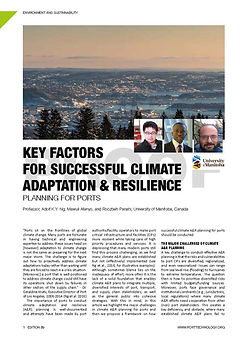top of page
Publications
Special Issue:
COVID-19 on Maritime Industry
JOURNAL OF THE INSTITUTE OF SEATRANSPORT
The content can be access through the link below: https://d186f1e0-1725-4784-9a06-99d30c753aca.usrfiles.com/ugd/d186f1_4262b30221ff4e5d86e1a3946a5b47f1.pdf

Key Factors For Successful Climate Adaptation & Resilience Planning for Ports
Adolf K.Y. Ng, Mawuli Afenyo, and Roozbeh Panahi
We offer a framework to address the key factors that port authority/facility operators should tackle so as to conduct successful climate A&R planning. It will facilitate ports to collaborate with other (non) port stakeholders to develop more cohesive strategies to adapt and become more resilient to climate-related impacts. Also, it increases the chances for them to secure alternative funding sources for such purpose. To successfully develop such a plan, the establishment of a quality, multidisciplinary team that can effectively initiate, complete, improve and support the model is pivotal. The details can be found here: https://static.wixstatic.com/ugd/d186f1_2e6bec4b7287406db7eae5ec5302f1a0.pdf

A Method for Assessing the Socio-Economic Impacts of
Oil Spills in Arctic Area
Mawuli Afenyo, and Adolf K.Y. Ng,Changmin Jiang
This paper develops the Socio-Economic Model for the Arctic (SEMA), a probabilistic graphical model based on Bayes’ theory, in assessing the socio-economic impacts of oil spills in the Arctic area. It is illustrated through a case study and scenario-based analysis. The results of the latter using SEMA is that the size of vessel and the oil type spilled during shipping in the Arctic are the most critical factors contributing to the impact of oil spill. Further, to a small
extent, the response methods used, and the season of operation can also be determinants. The contribution of the latter would increase when more ice melts and ice-breakers are deployed.
SEMA however faces challenges related to limited and non-existent of data in some cases. To overcome this shortcoming, a participatory modeling approach has been proposed which will
involve collecting data from all stakeholders in Arctic shipping especially the indigenous communities to be used as inputs. Despite the limitations of SEMA at the moment, we believe that the model is valuable for contingency planning for oil spill, allocation of resources, and decisions to insure ships going through the Arctic region. The details can be found here: https://static.wixstatic.com/ugd/d186f1_a0b9714a4cc449718f597680a37f14c0.pdf

Maritime Transport and Regional Sustainability
Adolf K.Y. Ng, Jason Monios, and Changmin Jiang (Eds.)
The book is a critical examination of the developing global connections between maritime transport and regional sustainability. It provides a comprehensive, holistic examination on how the maritime transport sector helps regions to achieve their sustainability goals, especially focusing on the challenges posed by climate change. It analyzes maritime transport from multiple perspectives, establishing a strong theoretical framework drawn on evidence from both the developed and emerging economies across the globe. It identifies commonalities that contribute to a coherent transport-region relationship, including how maritime operations, planning, and management impact regional governance. Tracing the vital threads linking transport to its regional surroundings, it analyses the major issues and challenges that maritime transport researchers, planners, and policymakers face. The details can be found here: www.elsevier.com/books/maritime-transportation-and-regional-sustainability/ng/978-0-12-819134-7

bottom of page
